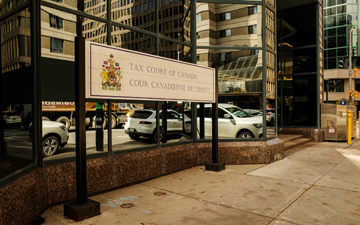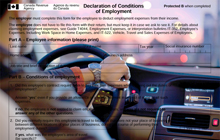Case Commentary: Persaud v The King — When can you claim tax deductions (Including medical bills) for dependants?

Tax residence is key, says Canadian tax accountant and lawyer David J Rotfleisch, to claiming medical expense deductions for dependents under the Income Tax Act
Introduction: Dealing with tax residence when claiming a deduction for a dependant
 |
David J Rotfleisch, CPA, JD is the founding tax lawyer of Taxpage.com and Rotfleisch & Samulovitch P.C., a Toronto-based boutique tax law corporate law firm. |
Several provisions of Canada's Income Tax Act allow individuals to claim medical expenses as a deduction. This includes subsection 118.2 of the Tax Act, which allows a taxpayer to claim medical expenses for a dependant. Whether someone qualifies as a dependant was the core issue in the case of Persaud v. The King.
This case, Docket 2023-1392(IT)I, involved an appeal to the Tax Court of Canada by Michael S. Persaud (the "Appellant") against a reassessment by the Canada Revenue Agency ("CRA") concerning his 2019 taxation year. The appellant sought a medical expense deduction for healthcare costs incurred for his father, Dennis Persaud, who fell acutely ill while visiting Canada. However, the Tax Court upheld the CRA's reassessment and found that the father was not a dependant under the section.
Background of the Case: Unexpected health issues and medical costs
Dennis Persaud, a citizen and resident of Guyana, visited Canada on a visitor's visa intending to stay for about two weeks in May 2019. During his stay he suffered a major heart attack and remained in a Canadian hospital for eight weeks until July 2019, receiving acute and rehabilitative medical care.
The Appellant paid over $18,700 for his father's, Dennis', medical expenses, which were not covered by Canadian health legislation. The Appellant claimed these expenses as a medical expense deduction on his 2019 tax return, but the CRA denied the claim.
Key Issue of the Case: Qualifying as a dependant under paragraph 118(6)(b) of the Tax Act
The crux of the case revolved around whether Dennis Persaud qualified as a dependent under the Tax Act, specifically under paragraph 118(6)(b). Paragraph 118(6)(b) sets out that:
Definition of dependant
(6) For the purposes of paragraph (d) [ ...], dependant, of an individual for a taxation year, means a person who at any time in the year is dependent on the individual for support and is
[... ]
(b) the parent, [... ], if resident in Canada at any time in the year, of the individual or of the individual's spouse or common-law partner.
The Tax Court found that a taxpayer must satisfy three components in order to successfully claim the medical expense deduction in relation to a third party. The recipient of the treatments must be (1) related in some way ("kinship"); (2) be dependent on the taxpayer for support ("dependency"); and, (3) if not a spouse or common-law partner or descendant, then fall within a degree of other kinship and be a "resident in Canada at any time in the year" ("residence").
Court's Analysis: Main contention of residence
On the first component of Kinship, the Tax Court found that this was satisfied due to Dennis being the Appellant's father. This first component was thus factually and legally satisfied.
On the second component of dependency, the Tax Court found that Dennis was factually entirely dependent upon the Appellant. The amounts paid to support Dennis' treatment, accommodation, and rehabilitation to allow him to leave the hospital were solely paid by the Appellant. The Tax Court noted that there was no case authority on point for the wording of "a person who at any time in the year is dependent on the individual for support." Nevertheless, the Tax Court found that the component of dependency had been met.
The third component of residence was where the main contention of this case lay. Specifically, the issue was the wording in paragraph 118(6)(b) of: "residence in Canada at any time in the year." The Appellant argued that Dennis's 6-month visitor visa and his eight-week stay in Canada constituted residence for the paragraph. The CRA contended that the phrasing should be treated the same as subsection 2(1) of the Tax Act, which directs tax to "be paid on taxable income... of every person resident in Canada at any time in the year" and uses the common law concept of residency. The test for the common law concept requires one to be "ordinarily resident in Canada." The Tax Court highlighted that neither party produced much authority on the issue of the wording with respect to the use of the phrase elsewhere in the Tax Act or previous caselaw.
The Tax Court found that repeated words in an act of Parliament are to be attributed, if possible, a consistent meaning throughout the act. The Tax Court, relying on decisions by the Supreme Court of Canada, found that there was a presumption of consistent expression and application of wording throughout an act unless it was clearly stated or where circumstances that it was not the intention of Parliament.
The Tax Court analyzed the repeated use of "resident in Canada at any time in the year" within the Tax Act and caselaw where at issue was residence for a claim for deductions. From the previous caselaw that involved dependants that were overseas, the Tax Court concluded that the "dependant must still therefore be a resident of Canada, as the meaning of resident is normally understood at common law." Additionally, the Tax Court found that the phrase "resident in Canada at any time in the year" is found 17 times in the Tax Act. Most importantly, was that it is found in section 2(1).
In concluding its analysis of 118(6)(b), the Tax Court found that the use of "at any time in the year" meant that one must be "resident in Canada" for the purposes of satisfying the criteria of being a "dependant." Therefore, to be "resident in Canada", the normal rules of residence should be used which are otherwise applicable to other sections of the Tax Act to yield consistent application. Meaning that there were two circumstances where a dependant could be considered a resident of Canada. That is the dependant could be deemed a resident under the Tax Act or a factual resident under the common law.
To be deemed a resident under the Tax Act, the taxpayer must spend 183 days or more in Canada per subsection 250(1) of the Tax Act. There was no dispute that Dennis was not a deemed resident as he did not spend 183 days or more in Canada.
It found that Dennis Persaud did not meet the criteria of being a factual resident of Canada in 2019, as his visit was intended to be temporary, and he did not intend to establish residency.
Despite Dennis's prolonged stay due to medical reasons, there was no evidence suggesting an intention to permanently reside in Canada. The purpose of the trip was to visit his family in Canada and his trip was only prolonged due to the heart attack. There was no evidence otherwise establishing that Dennis was planning to stay in Canada. Thus, the Tax Court concluded he was not a factual resident.
Therefore, the Tax Court dismissed the appeal, ruling that Dennis Persaud did not meet the residence requirement for claiming the medical expense deduction. This decision underscores the importance of understanding how the statutory language is interpreted and the application of common law principles for tax purposes. Despite the circumstances surrounding Dennis Persaud's medical emergency, the legal criteria for claiming the medical expense deduction were not met, leading to the dismissal of the appeal.
David J Rotfleisch, CPA, JD is the founding tax lawyer of Taxpage.com and Rotfleisch & Samulovitch P.C., a Toronto-based boutique tax law corporate law firm and is a Certified Specialist in Taxation Law who has completed the CICA in-depth tax planning course. He appears regularly in print, radio and TV and blogs extensively.
With over 30 years of experience as both a lawyer and chartered professional accountant, he has helped start-up businesses, cryptocurrency traders, resident and non-resident business owners and corporations with their tax planning, with will and estate planning, voluntary disclosures and tax dispute resolution including tax audit representation and tax litigation.
Visit www.Taxpage.com and email David at david@taxpage.com. Read the original article on Tax Law Canada. Photo David Rotfleisch courtesy Rotfleisch & Samulovitch P.C. Title image: iStock (Ottawa, Ontario, Canada - October 8, 2020: A sign for the Tax Court of Canada at 200 Kent Street in Ottawa).









(0) Comments